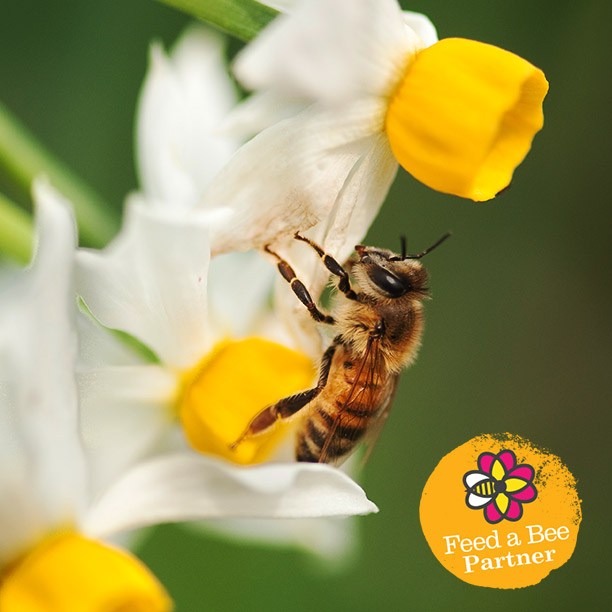
This summer Research Triangle Park became an official partner of the Feed A Bee campaign with RTP-based Bayer Crop Science. Feed A Bee began as a social media campaign (#feedabee on Twitter and Instagram) that exploded into a national movement of people, companies and agencies who pledge to increase bee habitat by planting native, bee-friendly plants on their land. Not a wildlife person? It’s okay, I get it. Bees aren’t for everyone.
Except they are actually if you think about how every third bite of food on your plate was brought to you by the handiwork of a bee or other insect pollinator. You see, when bees are hovering around the daisies in your yard or are checking out your Coke can at the neighborhood pool, what they’re really looking for is nectar. Nectar is the sugary, syrup-like liquid on the inside of flowers that bees, hummingbirds and butterflies drink through their straw-like mouths. It’s their main source of food. And while they’re snacking on their favorite drink, their little faces, legs and feet get covered in the plant pollen, which plants use to reproduce.
“Back up, Lisa. This sounds like Intro to Bio, and I dropped that course along with that bad boyfriend I had way back in college.”
Dudes, I get it. Stay with me.
Bees carry pollen to every plant they visit. Every time they land and lift off, they unknowingly mix pollen from other plants. And by that they’re ecologically ensuring that the plants that are several yards, and even miles away from each other, still have a chance to bump and grind. That’s right- bees are the Tinder of the plant world. They make plant sex happen. Do I have your attention now?
Without bees, there would be no more hops for beer, no more chocolate for lonely Friday nights and no more honey for your tea the morning when you’ve once again sworn off caffeine (and p.s. bees pollinate coffee plants too). For a full list of all your favorites that require bees and other pollinators for food production, check out this list at Pollinator.org.
Remember the “Got milk?” ad campaign? The one where celebrities have milk mustaches? It’s time we started a “Got bees?” campaign only instead of a milk glass we show desperate people with empty coffee cups, and hangry folks with empty salad plates. This is real, you guys. We need bees to survive.
Until then, we have Feed a Bee. Drop by RTP Headquarters to pick up some bee-friendly seed packets, and look for us handing them out at other Earth-friendly events like this one we had back in June. If you really want to go deep, encourage your company or agency to become a Feed A Bee partner like us and you’ll have access to thousands of seeds to completely transform your community park or corporate landscape. Bee-friendly plants are especially impactful in places like golf courses, school grounds, corporate campuses, along roadsides and highways and at state agency buildings where there are typically few native plants and acres of well-manicured lawns. Lawns are food deserts for bees and other pollinators, which means more bees hanging around your Coke can instead of out enjoying the nectar in the meadows we’ve made for them. All you need to do is register at feedabee.com and Bayer CropScience will send you seeds and a list of additional plants suitable for your area. Best of all, it’s free!
As part of the Feed a Bee movement, Research Triangle Park joins the NC Department of Transportation, NC State University, Duke Energy, The Produce Box, Back2Earth Farms, local schools and even North Carolina’s own, James Taylor. (Millennials are all like “who?!” It’s okay, click here. ) I’ll leave you with a favorite quote from one of my most favorite books of all time: “Bees do have a smell, you know, and if they don’t they should, for their feet are dusted with spices from a million flowers.” ~Ray Bradbury, Dandelion Wine.